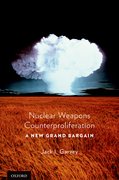Nuclear Weapons Counterproliferation: A New Grand Bargain proposes a new legal and institutional framework for counterproliferation of nuclear weapons. Its proposal is designed to remedy the widely acknowledged breakdown of the architecture of the Nuclear Non-Proliferation Treaty on which we can no longer rely for global nuclear security. First, Nuclear Weapons Counterproliferation defines the distinctively dangerous character of contemporary nuclear risk and explains why the Nuclear Non-Proliferation Treaty no longer provides a viable foundation for counterproliferation of nuclear weapons. It then sets out the reforms needed in order to limit the radical increase in availability, for rogue governments and terrorists, of nuclear weapons related material and technology. Garvey then proposes a new counterproliferation architecture, to be built on presently available scientific, legal, and institutional resources, which could achieve a critical reduction of nuclear risk and an expanded deterrence. Guiding principles for establishing this new architecture are formulated, including, most importantly, the principal mechanism for implementation, a proposed United Nations Security Council Counterproliferation Resolution applying equally for all states. This book presents what may be our best opportunity to secure a profoundly more effective global nuclear security and counter the world's current course to a catastrophic nuclear detonation.
TABLE OF CONTENTS
Jack Garvey is Professor of Law at the University of San Francisco School of Law, where he is also Chairman of the International Programs Department. Professor Garvey holds degrees at the University of Chicago, Harvard College, Oxford University, and Harvard Law School. Professor Garvey served as law clerk for Judge Hubert L. Will of the U.S. Federal District Court in Chicago and also as legislative assistant and speechwriter for Senator George McGovern, with responsibility for foreign policy positioning of the McGovern campaign for the Presidency of the United States. Professor Garvey practiced international law in San Francisco with the firm of Graham and James. |

Aucun commentaire :
Enregistrer un commentaire